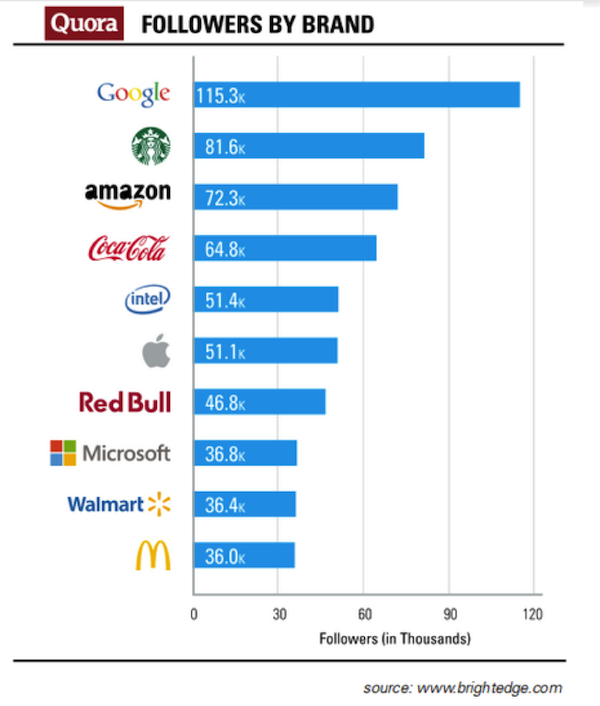Brands are looking beyond social media giants like Facebook, Twitter, and Google+ to more niche sites such as Pinterest, which puts a big emphasis on visuals.
Another niche social player worth exploring is question-and-answer site Quora.
Quora ranks questions and answers by user engagement. Social media metrics on this platform center around the number of followers, views, votes and shares each question has.
For example, in 2012 the most popular question on Quora was, “What are the best stories about people randomly meeting Steve Jobs?” with the answers providing a multitude of insight and shared experiences on the technology pioneer.
Now let’s look a little deeper at how brands and businesses use Quora.
Quora Has 2 Million+ Users
Quora has an estimated 2 million users as of January 2012. That pales in comparison with Yahoo Answers’ 69 million and Answers.com’s 49 million users. However, keep in mind that Quora is a relatively new entrant and while Quora has attempted to add users through new offerings, such as publishing blogs, quality still trumps quality on Quora.
Quora doesn’t allow company accounts so it does not make sense to ask questions like “How many Top 100 brands are on Quora?” What you can do is track how many threads are related to these brands.
Eighty-four percent of top 100 brands have at least one discussion thread dedicated to them. Users can post questions in these threads, reply to questions, write reviews, rate answers, and share this content in and outside Quora.
Another interesting finding is that 98 percent of the brands being discussed on Quora have more than one thread.
For example, a search for Starbucks returns threads related to the overall brand, location-specific brand such as Starbucks UK, products like the Starbucks Card and brand elements like the Starbucks logo.
The implication is that different elements of a brand are being discussed including the products, customer service, business practices, branding, geo-specific topics, user help topics, and corporate responsibility, among others.
The number of followers for threads related to the top 100 global brands crossed the million mark this year and stands at 1.3 million as of March 2012.

How Brands Can Participate on Quora
Company accounts aren’t allowed on Quora. However, that doesn’t mean all is lost for brands that want to participate in discussions. A brand representative can openly identify themselves and then contribute.
Here are a few steps to get started:
- Follow related topics: Identify topics related to your brand and/or your industry. Expect to see multiple topics that might be relevant to your business. Follow a handful of threads based on relevance or popularity – prioritization is key.
- Prioritize content of followed topics: It is very important to know the content of the topics that you choose to follow. These topics could be industry expertise, your customer support and advice on how to buy solutions that you can potentially offer. Make a list of the top sub-topics being discussed.
- Assign and train experts to contribute to discussions:For each sub-topic/conversation that you would like to contribute to, identify experts in your organization who can add value to these conversations. Train these experts on participating on Quora in compliance with Quora guidelines and best practices. These include:
- Identifying yourself explicitly as a representative of your company/brand
- Evaluating whether a response to a question is required
- Providing information and perspective that is of value to users
- Not selling – this hurts your company’s image and could also result in your experts being blocked by users and losing followers.
- Track metrics to measure your experts’ engagement:Metrics you could track include:
- Number of followers for the topics that are relevant to you, number of followers for each of your experts
- Number of answers for each expert
- Number that are voted up and voted down for each expert
- Number of questions posed by each expert.
Don’t obsess over these though. Quora is all about quality and credibility, not quantity.
Quora as a Blogging Platform and More
Contributing to conversations on Quora was the only way to go until Quora announced the launch of its blogging platform. Touted as “great for writers who don’t have an audience and also for bloggers who have an audience but want to reach more people,” it offers brands another avenue to get their message across. Use this guide to get more clarity on the benefits of Quora blogs.
Quora can also be used to inform your search campaigns by optimizing your buyer personas, generating ideas for new content, and competitive intelligence.
As always, there is the SEO angle to anything social. Quora threads rank in search results, especially for long tail queries. Keep this in mind as your brand representatives participate in discussions on Quora.
The quality of the content contributed on Quora and the credibility of the contributors, evident from the community’s response to their posts, opens up a world of possibilities on how brands can use Quora.
Jimmy Wales is on Quora
How can a representative of a company issue a clarification? See the following thread about online piracy in the age of free sharing of information, as Wikipedia does. Wikipedia founder Jimmy Wales explains Wikipedia’s stance.
The more important message is that someone as influential as Jimmy Wales participates in discussions on Quora.

Conclusion
Clearly, the world of social media is heavily fragmented. As brands seek to engage users, they would do well to look at the usual suspects but also explore networks that target niches.
Just as Pinterest is ideal for visuals, Quora is great for blogging, answering and peer networking, among others. Where you choose to focus your efforts should include a thorough analysis of your target audience, business model, industry and your goals for each network.

